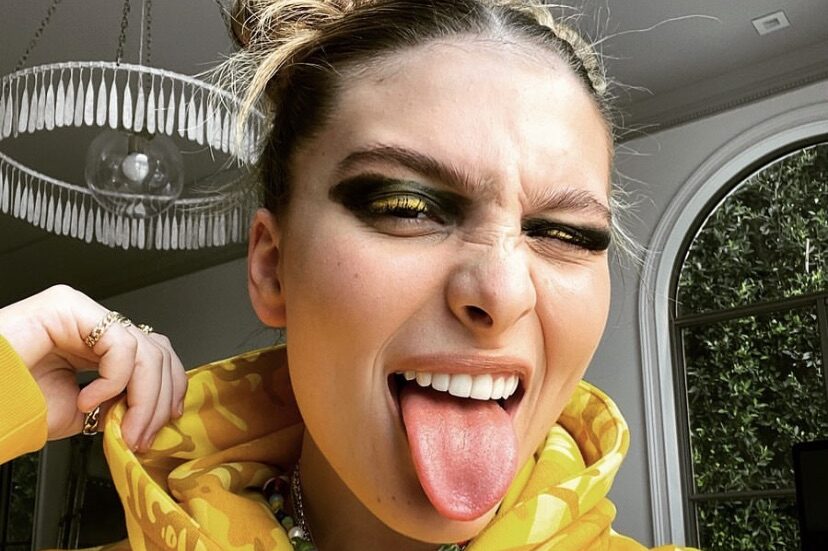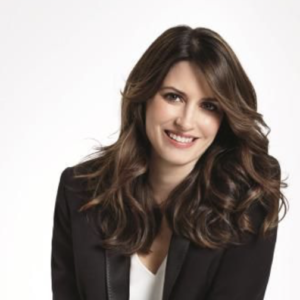“I think I’m a primary person,” Grace Gaustad tells me. They’re referring to the Palm Palette in Primaries, a slim, transparent case of vivid eyeshadow shades from Bakeup, the new beauty brand they cofounded.
But when I look at Bakeup’s series of palettes—including Pastels and Neons—I see something more than makeup. I see feelings. Bright feelings. Gentle feelings. Edgy, get-outta-my-way feelings. And Grace Gaustad, as a songwriter and human being, knows from feelings.
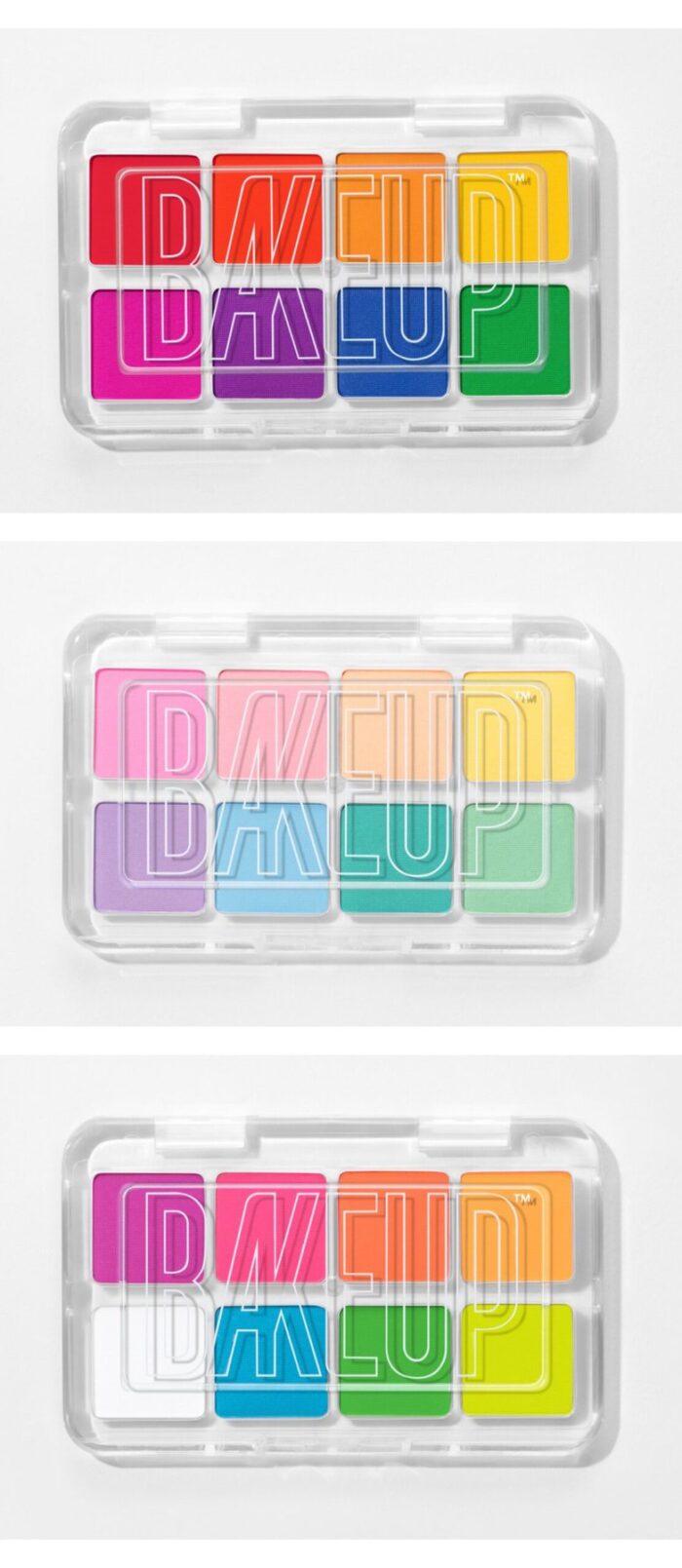
Their voice brims with emotion. It is hauntingly cool. Innocent and knowing, soothing and raspy, as poppy as it is purposeful. Lyrics and beats just feel pure. Not in the puritanical sense. In a truly-me-for-all-the-world-to-see way.
“This is the voice of this generation, as Nirvana was for us,” commented one Gen X listener on Gaustad’s YouTube. When I tell Gaustad about this mic-drop statement—repeated by hundreds of similar comments—they’re humble and thankful. (The pastel part, you see?)
Grace Under Fire
At 21, Gaustad has already self-released two albums (and is working on a third), launched a nonprofit benefitting youth mental health, and designed Bakeup with Jo Baker—nbd, just Sharon Stone’s makeup artist.
“Every face has a story,” the shadow palettes call from their boxes—and mean it. “Jo is at the front of storytelling makeup,” says Gaustad. “When Jo and I first met, I wanted to have the makeup, hair, and outfit help tell the story of whatever the song was about,” they explain. “And the stories really took off in the makeup looks. We designed all the looks and the song’s meanings and used colors and shapes to tell the message.”
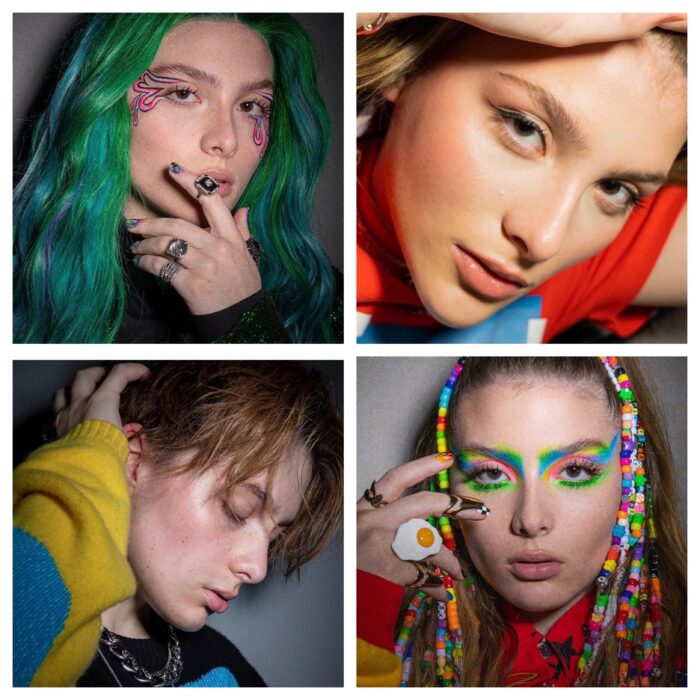
An example: In “93 Days,” Gaustad sings about going to therapy for the first time “and having to deal with the ugly end problems that I maybe don’t want to talk about,” they say. “So we created gritty black eyeliner with soft pastels. Our goal was to have the soft pastels represent getting better, and then the gritty black was we gotta go in and talk about our problems. Just the juxtaposition of two things that were so polar opposite, that healing is beautiful.”
A vocal and visual chameleon, Gaustad writes songs filled with this type of self-discovery. Now happily in a relationship with their girlfriend, Katie Kelly, Gaustad poured their identity struggles into their first album, Blkbx, which came out in 2021.
“I need a more honest place, somewhere I can be the way God made me, cause she doesn’t make mistakes,” Gaustad belts in “Red,” their LGBTQ+ anthem. Or, in my personal fave, “Like a Person”—whose video features Gaustad and TikTok star Dylan Mulvaney, a trans woman (both shown below), back home for a holiday gathering—the refrain nods to a type of masking common in the LGBTQ+ community: “It’s time to play the role again. The one I never asked to be in, to be in.”
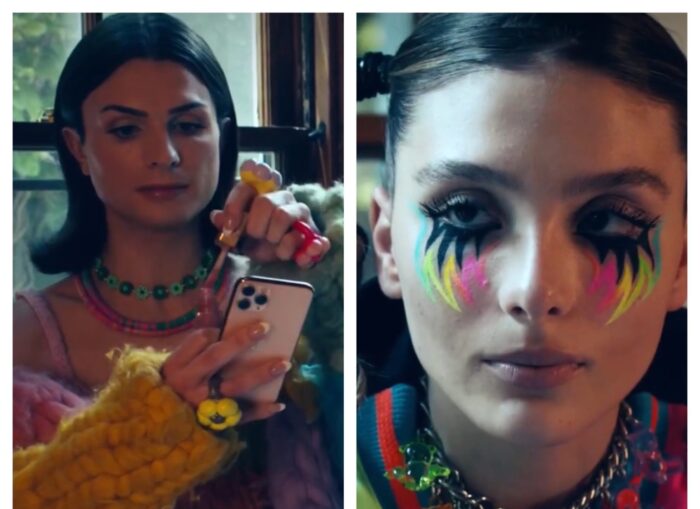
Mental health is woven throughout. “I talk about bullying a lot, because it’s really hard when you’re a young person, when you’re trying to find yourself, and you have all these people bashing you in the process,” Gaustad says. “It sets you back over and over.
“In high school,” they continue, “I was trying to figure out my sexuality, and unfortunately I got outed to my entire school by an older partner, and that was really hard to go through because I wasn’t ready to tell that story. I hadn’t figured it all out. Being put out there and having to figure it out in a spotlight.”
Sign up for our free newsletter
Legit tips and cool copes, delivered straight to your inbox.
By completing this form you are signing up to receive our emails and can unsubscribe anytime.
When Blkbx launched, “I got so many messages from people who really found themselves through it,” they say. “I had thousands of messages from people [about ‘Red’] saying, This song helped me come out. With ‘Code Black,’ [people said], This song helped me realize I also have depression and I have to deal with it.”
The black box, Gaustad explains, “is a metaphor for your heart, your mind, your soul. Everyone has hidden things, things still tucked away, insecurities they’re not ready to face yet.”
To help people deal, Gaustad created BlkboxProject.org, a nonprofit that offers resources around such topics as childhood trauma, self-worth, and body dymorphia, along with educational videos from psychologist Jazz Robbins, Ph.D. “Jazz dives into these heavy topics that teens don’t really have a way to get a whole lot of information around,” says Gaustad.
The Sounds of Soothing
The idea of music as emotional salve goes back to Pythagoras, who, along with developing mathematical theories, prescribed musical scales for psychological conditions in the B.C. days. As per usual, he was ahead of his time: Research has shown that music therapy—which incorporates music interventions in a clinical setting—can be more effective than psychotherapy for certain mental health conditions.
But simply slapping on AirPods and cue’ing up Spotify can ebb anxiety, too. According to a meta-analysis of 104 studies published in Health Psychology Review, listening to music may deactivate the amygdala, the part of the brain that helps regulate emotions, in turn decreasing stress and making you feel happier.
It’s something Gaustad understands instinctively. “A lot of young people are looking for a place to belong, and a lot of time that comes through musicians and artists, by following their favorite artist, those people they look up to talking about their own struggles,” they share. “I always say there’s no better teacher than someone who’s lived it themselves.”
They’re now doing for others what Lady Gaga did for them. “Lady Gaga offered so much strength and visibility to the LGBTQ+ community, a group of people who felt marginalized,” Gaustad says.
Indeed, stats show that people in the LGBTQIA+ community are more than twice as likely as their straight peers to have an anxiety disorder or depression. Increased stress from hostile environments at school or work can lead to greater challenges for young LGBTQ+ people.
“It’s not that depression presents differently among different groups,” Julia Frew, M.D., a psychiatrist at Dartmouth-Hitchcock Medical Center in Hanover, New Hampshire, told Mental, “but more that you’re at a higher risk because of the micro-aggressions and discriminations you face all the time.”
Gaustad’s latest single, “Disappear”—part of their second album, Pillbx—seems to take on such issues, confronting suicidal thoughts. It hits at an unfortunately relevant moment, as a recent CDC report revealed a disturbing 60 percent rise in teen girls considering suicide.
It may seem dark, but “Disappear” is actually a song of hope, a message to listeners that they’re not alone. In the video, actress Mariska Hargitay—one of Gaustad’s regular collaborators—plays an angel, repeating these words to Gaustad’s character: “Despite what you may think, the world is not a better place without you in it.”
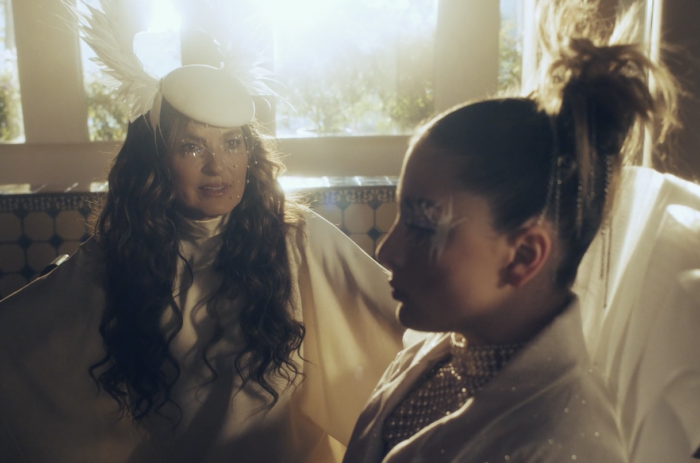
Makeup and the Mind
For Gaustad, creativity is a personal refuge. On crappy days, “I immediately turn to my music or art,” they say. “I think it’s important to have an outlet of creative expression, because sometimes you don’t have the words to show how you’re feeling, but you might be able to put it into a recipe or art piece or put it somewhere else, where you can turn those feelings into something really productive.”
Makeup, often brushed off as superficial, can be one such outlet. When researchers in a Sage Open study asked people why they use cosmetics, one of the main themes was “fun, creativity, and well-being.” Therapeutic benefits, the study authors noted, are a scarcely recognized M.O. for applying makeup.
But Gaustad gets it. “When Jo and I set out to create a brand, we wanted to hone in on this idea that creativity and art expression and identity are all tied into makeup and how you present yourself,” says Gaustad. “We want to see your most authentic self with makeup.”
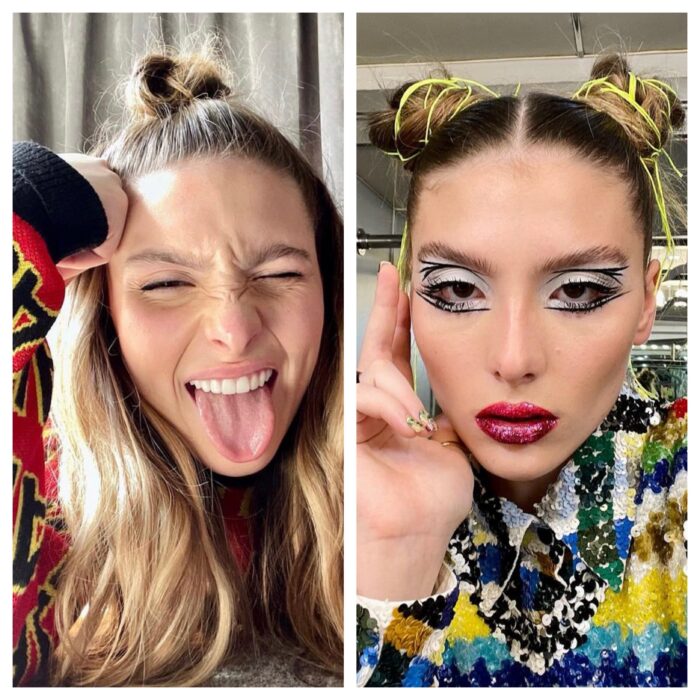
It’s a compelling idea, that adding something external can help reveal the internal. The Sage Open study offers science to the theory. “Paradoxically,” wrote its authors, “it seems that cosmetics may be used to signify ‘the real self’ to others.”
This is part of Bakeup’s ethos, a purposeful divergence from what Gaustad observed among beauty influencers over the past few years. “Makeup became very rigid and done only in one way,” they say. “We wanted to make a brand that says, Have fun with the products. Make an art piece out of yourself. It doesn’t always have to be so glamorous.”
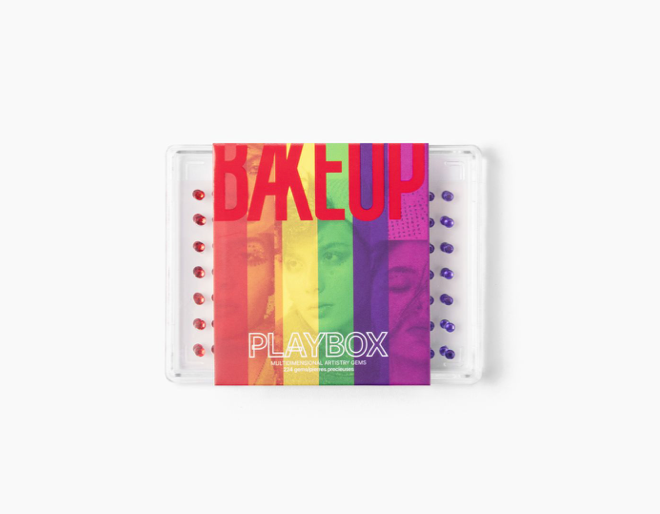
Enter Bakeup’s tiny, glimmery face stickers. Launching today in honor of Pride Month, The Pride Playbox, $15, is filled with 198 pinhead-size, rainbow-colored gems. With every purchase, Bakeup will donate $1 to nonprofit organizations that support young people in the LGBTQ+ community.
Your True Colors
There’s makeup therapy, and then there’s therapy-therapy, which Gaustad talks about as freely as they do gemstones. “I think a lot of people are afraid of therapy—and, honestly, rightfully so. Any time you have healing going on, it’s gonna cause disruption,” they say. “We have a way of getting very comfortable with pain. I think therapy’s also one of those things that you’ve got to want to get better and deal with your shit. You have to want to do the work.”
GOTTA READ: Think You Can’t Afford Therapy? We Got You
In their video for “93 Days”—the song about a first-timer in therapy—Gaustad does the work with Hargitay, who stars as the therapist. “WOW, this song is powerful,” wrote one YouTube fan. “Mariska has been my therapist for over 22 years, she just doesn’t get paid for it.” Another said, “I have been dealt a lot of trauma throughout my life, and I didn’t begin to heal until I started watching SVU.”
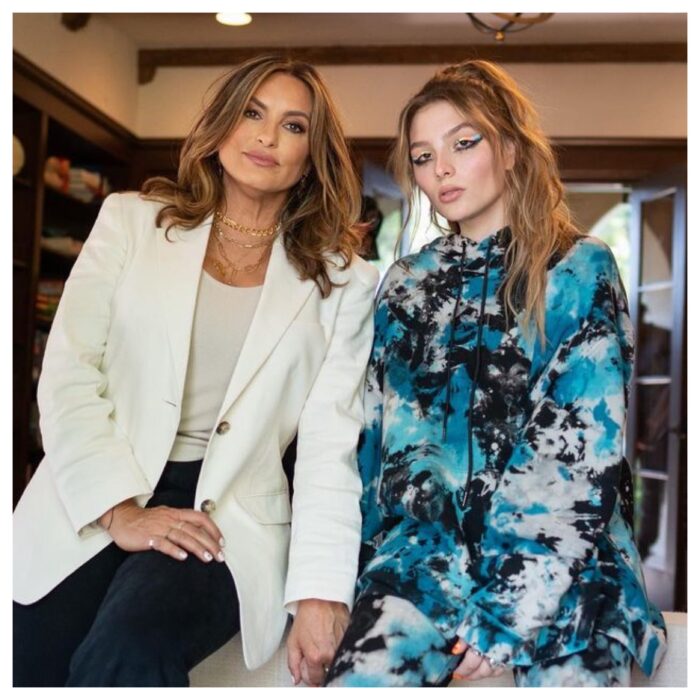
Hargitay does seem to occupy a cultural spot as collective therapist. “Mariska is very similar in real life to the character Olivia Benson. She stands up for people, she stands up for the right things, she embodies a lot of what people love and adore about that character,” Gaustad explains. “It’s almost like Olivia Benson was based off of her, the person.”
Beyond therapy, there’s another place Gaustad goes in moments of chaos: outside. “Getting outdoors in whatever capacity is really important to keeping good mental health, because we were not designed to sit indoors and look at a screen,” Gaustad says, calling it “the worst social experiment of all time.”
Leaving the digital world for a greener one is not only crucial for general well-being, it may legit cut down on mental health disorders. According to a study in Science Advances, being in nature is linked with a decreased incidence of anxiety disorders, ADHD, and depression.
Even looking at images of nature has been shown to produce calm. Could the same be said for peeping shades of makeup?
Bakeup’s shadows certainly provide a saturated color hit, even in the just-released fourth palette, Desert Road Trip, a gorg array of dusty neutrals. It’s a great place to start if all the vibrancy feels intimidating.
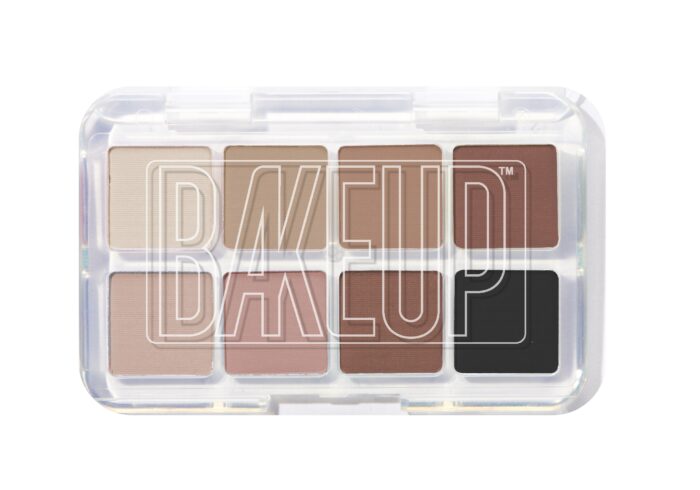
“People see me in some of these video looks, and that’s not what we’re suggesting—that was three and a half hours in the makeup chair with one of the best artists,” says Gaustad. “If you are someone who’s scared, just start super small, change one little thing to make your look a tad more interesting. Add a little color. Add a shape or two. You can put three little stars around your eyes and call it a day.”
As our chat draws to an end, I ask Gaustad which Bakeup product is their fave, and their voice mimics the expression they make in so many photos, nose charmingly scrunched or tongue playfully out. “Recently I’ve been loving the Daily Meltdown,” they eventually answer, of the makeup-removing cleansing balm. “There’s been so many abrasive products out there used to get makeup off that tear off your skin. And the Daily Meltdown feels buttery almost. This creamy delicious thing you put on your face, and all of a sudden [the makeup] quite literally starts melting off.”
Through my decade-plus past as a beauty editor, I’ve seen lots of product names—basic, boring, punny, dumb—and I compliment Gaustad on Daily Meltdown, asking if it holds deeper meaning or is simply clever wordplay.
“Sometimes wearing heavy makeup in videos was hard for me because I have sensitive skin, and this is just a really great product,” they say. “But when I had to come out of full glam, I would have a baby meltdown, because I didn’t want to take off my rhinestones, my gems, those incredible looks. And I think a lot of people feel that way about taking off their makeup at the end of the day. So there’s definitely a metaphor in there.”
Mental Note: If you are having suicidal thoughts or experiencing a mental health crisis, text or call 988, the Suicide & Crisis Lifeline, any time day or night to speak with a trained counselor.
Geek Out on Our Sources
Pythagorus and Musical Therapy: https://www.ncbi.nlm.nih.gov/pmc/articles/PMC8566759/
Music and Emotion Meta-Analysis: https://www.tandfonline.com/doi/full/10.1080/17437199.2019.1627897
Teen Girls and Suicide: https://www.cdc.gov/media/releases/2023/p0213-yrbs.html
Makeup and Creativity: https://journals.sagepub.com/doi/10.1177/21582440211061573#bibr109-21582440211061573
Mental Health and Nature: https://www.science.org/doi/10.1126/sciadv.aax0903
